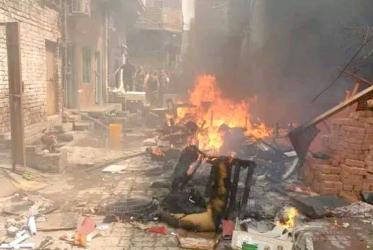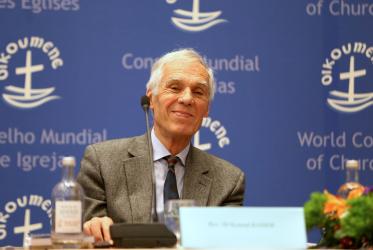By the WCC general secretary, Rev. Dr Konrad Raiser
Issued in Geneva, 17 November 2000.
It has been a centuries-old unwritten rule that at Christmas a cease-fire be observed in all situations of military conflict. Will this be the case this year as well? What do those warlords who force young people - and often enough children - to fight their dirty wars know and care about this rule? From Sierra Leone to Indonesia, from Israel and Palestine to Sri Lanka, from Colombia to Chechnya, our world seems to be engulfed in a deadly cycle of war, violence and destruction. A real culture of violence has taken root and is spreading, in open contempt of all the rules of humanitarian law. It manifests itself not only in armed conflict. Violence has become omnipresent in the streets, in subways, in schools and sports stadiums, in families and homes. Its victims are most often those who are different: members of ethnic, racial or religious minorities; refugees; people with disabilities; or simply the poor and marginalized.
Can this dynamic be stopped? In many places, people have begun to stand up and to form alliances resisting the culture of violence. Through its "Programme to Overcome Violence", the World Council of Churches has tried since 1994 to support such initiatives and give them greater visibility. Now at the beginning of the year 2001, the WCC will reinforce its efforts and launch a "Decade to Overcome Violence". This Decade is rooted in the conviction that Christians and their churches are called "to provide to the world a clear witness to peace, to reconciliation and non-violence grounded in justice". It is the objective of the Decade to open the space where an alternative culture of peace and reconciliation can grow.
Building a culture of peace and non-violence is an urgent demand, not only for political reasons. Churches are called to articulate the protest of the gospel against the cult of force and greed, against unbridled competition and impunity where fundamental human rights are being violated. The culture of violence is the result of a perversion of basic values; it manifests the inability to sustain relationships. Overcoming violence therefore has to begin in the hearts and minds of people. A culture of peace cannot be imposed from above. It grows where space is provided for learning how to resolve conflicts peacefully, to sustain difficult relationships, to encounter the stranger without anxiety.
Each year at Christmas, we hear the message of the angels: "Glory to God in the highest heaven, and on earth peace to those whom he favours" (Luke 2:14). We celebrate the birth of the "Prince of Peace" (Isaiah 9:6), the one who reconciled us to God and with each other and thus proclaimed peace (Eph. 2:17) and a new relationship between those who had been separated by alienation and hostility.
As we celebrate Christmas this year, let us consider what we can contribute to overcoming violence and building a culture of peace. Living in a situation where violence has become omnipresent, those who have heard and accepted the gospel of the peace of Christ are entrusted with the message of reconciliation. They are made ambassadors for Christ and called into a ministry of reconciliation (2 Cor. 5:18-20).
This, then, is our mission today as Christians: wherever the walls of hostility are being broken down, wherever communal conflict is being resolved peacefully, wherever women and children are being saved from becoming victims of violence, the peace of Christ is being proclaimed to the glory of God.




